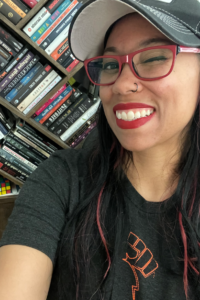

Tonia Ransom is the creator and executive producer of NIGHTLIGHT, an award-winning horror podcast featuring creepy tales written by Black writers, and Afflicted, a horror thriller best described as Lovecraft Country meets True Blood. Tonia has been scaring people since the second grade, when she wrote her first story based on Michael Myers. She’s a World Fantasy Award Winner, and This is Horror Award runner-up. She lives in Austin, Texas. You can follow Tonia @missdefying on all the socials. Risen is her debut book.
What inspired you to start writing?
I honestly can’t remember exactly. At night, I used to make up bedtime stories in my head to help me fall asleep. I put my first story on paper in 2nd grade for an assignment. It was Michael Myers fan fiction, and I achieved my goal of scaring my teacher…just not in the way that I’d imagined I would. But either way, I got hooked on the feeling of making people feel something with just words. I grew up in a very conservative community that frowned on horror, and I stopped writing for more than a decade. I eventually came back to it, and realized how important storytelling was for my mental health, and I haven’t looked back since.
What was it about the horror genre that drew you to it?
My dad loved horror, and I have 3 older brothers who also enjoyed horror as kids. Naturally, I wanted to be like them, so I started watching horror with them. I loved it, and though I didn’t realize it at the time, horror helped me make sense of the dark reality of the world I grew up in. Eventually, horror novels became a daily, hours-long escape for me, and I credit my love of horror with helping me through the darkest of times. It’s healed me, and I think it’s the most powerful genre for that reason.
Do you make a conscious effort to include African diaspora characters and themes in your writing and if so, what do you want to portray?
Absolutely! I write characters that look like me and my family, and, although my stories don’t always have Black themes, when I do write about Blackness and our culture, my goal is to show people the world from my perspective, in hopes of invoking understanding and compassion, and perhaps even spark an interest in learning more about Black cultural elements, like hoodoo and conjure. But I also actively choose to write stories without themes of Blackness to show that Black folks can write about more than our pain and struggle.
What has writing horror taught you about the world and yourself?
So much. I process a lot of subconscious struggle when I write. I almost never know what I’m working through when I’m writing a story, and it’s only after I look back on it that I realize what puzzle I was trying to solve. My novella, Risen, is about my dad’s death, and my fear that before he passed, he was trapped in his body, aware, but unable to communicate. My short story “Sorry, Wrong Number” was about fates worse than death and seeking revenge on those who’ve hurt us.
How have you seen the horror genre change over the years? And how do you think it will continue to evolve?
I love that Black horror is starting to get more recognition and traction, and that Black horror is no longer just stories of Black struggle and pain. I’ve found this to be the same in other cultures as well, and I love that horror gives us a glimpse into the greatest fears of various cultures. I think we’ll see more diverse perspectives in horror, and more horror that examines the us vs them mentality that’s permeating our culture right now.
How do you feel the Black community has been represented thus far in the genre and what hopes do you have for representation in the genre going forward?
I think that up until recently, Black people were not represented well in the genre, and were often used as token characters to prove how bad the monster was, or simply portrayed in ways that is uncharacteristic of our culture. That’s begun to change, and I hope to see more stories of Black people prevailing with their intelligence and wit, and no longer being used as monster fodder.
Who are some of your favorite Black characters in horror?
I love Candyman. That was one of the first horror movies I watched, and to see a Black character in horror was magical for me. There’s some problematic issues with the character himself, but overall, Candyman shaped me as a fan and as a writer, and for that I am forever grateful.
Who are some African diaspora horror authors you recommend our audience check out?
Obviously, Tananarive Due is amazing. Johnny Compton and Alex Jennings are both rising stars that I’m watching closely. My favorite Black horror writer is probably R.J. Joseph. Her work just resonates with me on so many levels, plus she’s incredibly talented.
What is one piece of advice you would give horror authors today?
Be authentic. Write from your heart and soul, and everything else will fall into place.
And to the Black writers out there who are just getting started, what advice would you give them?
Don’t be discouraged by rejections, or haters. There will always be people who hate your work, not because of what you wrote, but because of who you are, and for having the audacity to use your voice to share your perspective. You cannot reach people who aren’t open, so focus on the ones that are. Don’t cut yourself into pieces to make it easier for some people to stomach your work. Stay whole, and they can either choke or evolve.

